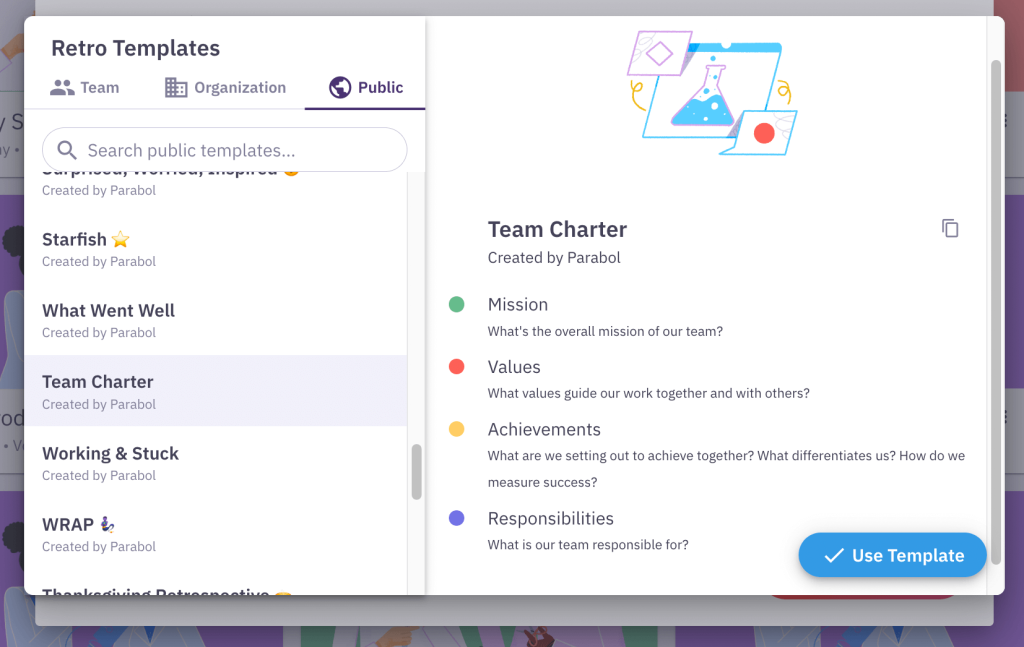Team Charter Template
Develop a constitution that drives your team forward

What is a Team Charter?
A Team Charter is a guiding document for high-performing teams. It answers big questions – why you’re here, where you’re going, and how you’ll get there.
Think of it as a roadmap through uncertain territory. Whenever you’re faced with tricky decision-making, conflict resolution, or other challenges, refer back to your Team Charter to get in touch with your mission, core values, and project objectives.
The most helpful charters are written collaboratively, by the people on the team themselves. That way, your Charter will represent your team’s actual values — not what whoever’s in charge thinks they should be.
That’s why a brainstorming session is such a good way to start writing your team’s Charter.
Team Charter brainstorm prompts
This Team Charter template includes four prompts, but you can also design your own team charter meeting by creating a custom template.
Your team leader can share these with the group to hone in on your team’s purpose and guide you through any challenge.
Mission
What does your team come to work every day to get done? This prompt invites everyone to brainstorm so you can come up with a succinct, yet accurate mission statement.
The answer to this question depends on your unique team. A project team would have a very different mission than an in-house team of data scientists, for example.
What’s at stake should you succeed or fail? Where does your team mission fit into your company’s overall mission or product goals, generally?
Example: Our mission is to make it as easy as possible for our customers to order food online.
Values
What values do you seek to uphold in your work together?
These could be values that inform your work with each other, the rest of your company, or even your customers. It’s okay if you bring different values to these different areas of work. As part of this you might want to set some ground rules together.
Example: We value independence and autonomy in our teamwork style.
Achievements
What milestones and deliverables must you meet to turn it into reality?
This is where you’ll make your team’s mission super-specific and concrete.
You’ll also need to define what success looks like. How will you know when you’ve achieved these goals? What metrics will you use to evaluate your work?
Example: We need to reduce friction around our online payment process. When customers can check out and pay in under 1.5 seconds, we will have reached our goal.
Responsibilities
What are your team’s responsibilities on your way to achieving that mission? How do they break down into individual responsibilities for each member of the team?
These responsibilities will often be tied to your job descriptions. But they might be more subjective, too.
Example: Our IT team is responsible for resource management, automating IT-related processes and workflows, and overseeing all IT integrations and project management within the company.
When to do a Team Charter meeting
The best time for a Team Charter brainstorm is when you start a new team, of course!
But if you don’t have a Charter, writing one – or improving the one you’ve got – is always a good idea.
Try this brainstorm when you onboard a new team member, need buy-in from stakeholders, or want to get an underperforming team back on track.
Psst. You can always repurpose this template for project charter meetings as well. A project charter meeting can help you with project planning, defining what project success looks like, and defining project scope.
How to create a Team Charter in Parabol
Parabol’s retrospective meeting type is a great way to run a Team Charter brainstorm with your team. Simply sign up for free and use our pre-built Team Charter template.
Once you’re in Parabol hit the add meeting button and choose a “retrospective” meeting.
Select the Team Charter template (or create your own)
Once you’ve selected “retrospective”, browse through Parabol’s library of 40+ pre-made and customizable retrospective formats. Find the Team Charter template and select it.

You can customize any Parabol template by cloning it. If you want to mix up the pre-built template, be our guest! You can also start your own Team Charter template from scratch if you want to. This is your meeting that serves your team’s goals, team operations, and team collaboration needs. So customize it!
Start your Team Charter meeting with an Icebreaker
Every Parabol retrospective begins with an optional icebreaker. This box is checked by default. You don’t have to do one, but we recommend it – especially for remote teams.
If you’re doing an icebreaker, you’ll have a random question to answer. You can refresh it if you want another option, and of course you can create your own if you want.

Brainstorm independently based on the Team Charter prompts
After the icebreaker you’ll move on to the reflect stage. This is where your team will do all their ideation and brainstorm in silence using the prompts above.
All reflections are kept anonymous at this stage to prevent groupthink. Parabol gives meeting facilitators the option to timebox this process so you can keep your meeting on track.
Group, and Discuss topics to form your Team Charter
Reveal your brainstormed cards and group them into themes. Vote on the most important ones together, and launch a discussion on what should go into your Team Charter.
You can use the discussion threads in Parabol to draft up Team Charter examples or ideas for consideration later.
In the future, you can always run a retrospective on how well your team abide by their Team Charter. Simply create a custom retrospective and ask for examples of when the team did or did not abide by different parts of the team charter.
Benefit from free meeting summaries
Parabol will send a summary of the retro when you end the meeting so nobody needs to take notes.
Of course, you can do this team retrospective in person, with a whiteboard or sticky notes. But it’s even easier in Parabol, especially if you’re an asynchronous or distributed team.
If you like this template, you might also like other blended retrospective ideas that focus on role definition, such as the Hands on Deck activity or one of our Futurespective ideas.